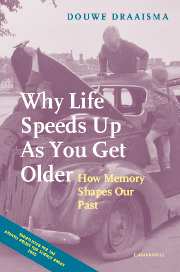Book contents
- Frontmatter
- Contents
- List of illustrations
- Acknowledgments
- 1 ‘Memory is like a dog that lies down where it pleases’
- 2 Flashes in the dark: first memories
- 3 Smell and memory
- 4 Yesterday's record
- 5 The inner flashbulb
- 6 ‘Why do we remember forwards and not backwards?’
- 7 The absolute memories of Funes and Sherashevsky
- 8 The advantages of a defect: the savant syndrome
- 9 The memory of a grandmaster: a conversation with Ton Sijbrands
- 10 Trauma and memory: the Demjanjuk case
- 11 Richard and Anna Wagner: forty-five years of married life
- 12 ‘In oval mirrors we drive around’: on experiencing a sense of déjà vu
- 13 Reminiscences
- 14 Why life speeds up as you get older
- 15 Forgetting
- 16 ‘I saw my life flash before me’
- 17 From memory – Portrait with Still Life
- Index of names
2 - Flashes in the dark: first memories
Published online by Cambridge University Press: 22 September 2009
- Frontmatter
- Contents
- List of illustrations
- Acknowledgments
- 1 ‘Memory is like a dog that lies down where it pleases’
- 2 Flashes in the dark: first memories
- 3 Smell and memory
- 4 Yesterday's record
- 5 The inner flashbulb
- 6 ‘Why do we remember forwards and not backwards?’
- 7 The absolute memories of Funes and Sherashevsky
- 8 The advantages of a defect: the savant syndrome
- 9 The memory of a grandmaster: a conversation with Ton Sijbrands
- 10 Trauma and memory: the Demjanjuk case
- 11 Richard and Anna Wagner: forty-five years of married life
- 12 ‘In oval mirrors we drive around’: on experiencing a sense of déjà vu
- 13 Reminiscences
- 14 Why life speeds up as you get older
- 15 Forgetting
- 16 ‘I saw my life flash before me’
- 17 From memory – Portrait with Still Life
- Index of names
Summary
We shall have to wait and see if our life ends with memory loss; what is certain is that it starts with it. Most people date their first memories back to somewhere between the ages of two and four, although there are extensions in both directions. And these first memories do not mark the end of that memory loss; rather they emphasize it. They are snatches, disconnected images; not only does nothing precede them but often nothing follows them for a long time either. ‘In probing my childhood’, Nabokov wrote in Speak, Memory, ‘I see the awakening of consciousness as a series of spaced flashes, with the intervals between them gradually diminishing until bright blocks of perception are formed, affording memory a slippery hold.’
But where does the darkness between the flashes come from? The memory of three- or four-year-olds, who have already learned and remembered all manner of things, seems to work well enough. It is at this very age that their vocabulary explodes. They chatter nonstop about what has happened to them, and their reactions tell us that they think about their experiences and that some incidents have made a great impression upon them. For children, the past is still a very long and undifferentiated ‘yesterday’, but there is no doubt that they remember it. And yet, within a few years almost all these memories have disappeared and nothing but flashes in the dark remain.
Freud called this form of memory loss ‘infantile amnesia’.
- Type
- Chapter
- Information
- Why Life Speeds Up As You Get OlderHow Memory Shapes our Past, pp. 15 - 30Publisher: Cambridge University PressPrint publication year: 2004

